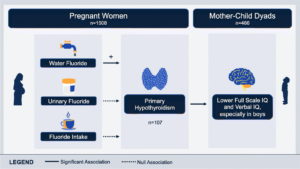Researchers say healthy thyroid function is crucial for fetal brain development and their latest research may explain earlier findings looking at fluoride and children’s IQ.

A new study led by scientists from Toronto’s York University in the journal Science of the Total Environment linked fluoride exposure with an increased risk of hypothyroidism in pregnant women. Fluoridated water was the main source of fluoride in the cohort. The study also looked at a smaller subset of participants with IQ test results in the children and found that mothers who had been diagnosed with hypothyroidism had boys with lower IQ scores than mothers with normal thyroid function.
Entitled, Fluoride Exposure And Hypothyroidism In A Canadian Pregnancy Cohort, the study discovered that a half-milligram-per liter increase in drinking water fluoride levels–roughly the difference in exposure level between the fluoridated and non-fluoridated communities–was associated with a 1.65 increase in odds of having a diagnosis or meeting criteria for hypothyroidism in pregnancy.
According to one study author, clinical neuropsychologist Christine Till, PhD, “The findings are concerning because hypothyroidism is a known cause of brain-based disorders in children.” (York press release)
The study’s authors say they hope that policy makers will consider this new research when evaluating the safety of community water fluoridation. They say that the fluoride compounds added to tap water are a major source of fluoride exposure for over 200-million people in North America, since approximately four in 10 Canadians and seven out of 10 Americans on public water supplies have fluoridated drinking water.
Women in general are more at risk of developing hypothyroidism, a condition that can lead to symptoms such as fatigue, weight gain and depression. In pregnancy, the demands put on the thyroid system increase substantially, especially in the first trimester when the fetus is solely reliant on maternal thyroid hormones.
The study followed more than 1,500 women participating in a multi-year study called the Maternal Infant Research On Environmental Chemicals (MIREC) study, led by Health Canada to investigate the impact of environmental chemicals on vulnerable populations, including pregnant women and infants. Women were recruited from 10 cities across Canada, seven of which have fluoridated drinking water. The study’s authors only included women who reported drinking tap water during pregnancy, and they followed participants throughout pregnancy, and followed their children into early childhood.
While fluoride’s ability to suppress the thyroid has been known since the 1930s when it was used to treat overactive thyroid, also known as hyperthyroidism, the mechanism by which fluoride may interfere with thyroid function is not entirely clear. The study’s lead author, Meaghan Hall, said that it may interfere with certain enzymes and iodine absorption, which is critical for thyroid hormone production.

This study is the strongest to date showing that fluoride causes hypothyroidism, as well as that the mother’s hypothyroidism is associated with lower IQ in the child.
It adds to a growing body of evidence that fluoride exposures from artificially fluoridated water is sufficient to impair thyroid function. Earlier studies finding an effect were in a study of nearly the entire population of England [Peckham 2015]; a large nationally representative sample from Canada using the CHMS survey [Malin 2018]; a case-control study in Iran [Kheradpisheh 2018]; and in a large sample of children in China where mean water and urine fluoride levels are only slightly higher than in areas with artificial fluoridation [Wang 2020].
Two studies have not found an association between fluoride at levels relevant to fluoridation and decreased thyroid function, but both suffered limitations that may explain why they did not detect effects [Barberio 2017, Shaik 2019]. The Barberio 2017 study did not consider iodine intake and the Shaik 2019 study selected only children with optimal iodine intake. The Malin 2018 study reanalyzed the same sample as Barberio 2017 but controlled for iodine and found that in those with iodine insufficiency fluoride exposure increased hypothyroidism. This could also explain why no effect was found in the Shaik 2019 study that was restricted to only children with optimal iodine intake.
This latest study’s authors also say fluoride levels in tap water may be a more reliable indicator of long-term fluoride exposure than urinary levels, which might better correlate with short-term exposure, they say.
